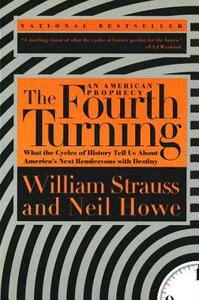Take a photo of a barcode or cover
97 reviews for:
The Fourth Turning: What the Cycles of History Tell Us about America's Next Rendezvous with Destiny
William Strauss, Neil Howe
97 reviews for:
The Fourth Turning: What the Cycles of History Tell Us about America's Next Rendezvous with Destiny
William Strauss, Neil Howe
dark
informative
reflective
medium-paced
this book was so crazy. It’s written in 1997 and it effectively forecasted the financial crisis, the Iraq war, and the rise of Trump! It delves into the Strauss–Howe generational theory which essentially posits that America goes through a recurring generational cycle. Obviously it’s not going to be the kind of non-deterministic or falsifiable historical claim we’d rather have from a scientific point of view since it’s based on Jungian notions of the human spirit, but it’s honestly such a thought provoking book that I think everyone can benefit from reading.
The author is guilty of cherry picking data to fit his hypothesis. He says that history is a cycle repeating itself regularly for 100 years or so. Within these cycles are stages, and then he goes on to find evidence that supports these stages. There a stage where wars break out, or a stage of change in awareness, and then proceeds to procure evidence for it. If you’re looking for evidence for vague things like change in awareness among the multitudes of happenings every moment, of course you’ll find something that might fit your graph. But these changes aren’t uniform or similar in scale.
The author also doesn’t explain well why this theory makes sense, only to point and say here’s some hand picked evidence for his theory.
I enjoyed the bits of history mentioned along the way and obviously history does rhyme but not bought in to his theory.
The author also doesn’t explain well why this theory makes sense, only to point and say here’s some hand picked evidence for his theory.
I enjoyed the bits of history mentioned along the way and obviously history does rhyme but not bought in to his theory.
Truthfully, I read two-thirds of it and stalled out. The premise is fascinating, but the book became tedious with repetition.
informative
reflective
slow-paced
Interesting theories about the cyclical nature of history.
However, some of his predictions were a little off- probably because the book was written before 9/11, and he had no idea how much that has changed the USA for the past 12 years.
Anyway, it was taking a long time and I was just too lazy to keep plodding through this one. And I didn't put much stock in the predictions... I imagine the author would like to update them, 15 years later...
However, some of his predictions were a little off- probably because the book was written before 9/11, and he had no idea how much that has changed the USA for the past 12 years.
Anyway, it was taking a long time and I was just too lazy to keep plodding through this one. And I didn't put much stock in the predictions... I imagine the author would like to update them, 15 years later...
I debated a lot between 3 and 4 stars, but decided to go with 4 since I think the authors made a convincing enough case that this book is worth reading. It would have been 5 stars if the case was truly compelling, but I really only think the takeaways can be had a fairly high level or you sort of have to read into it in order to gain some actionable insight.
I did find it interested to read it from a perspective of being 20 years from the publication date, and I think having seen the events of the past 1-16 years does lend additional credibility to the authors' "prophecy".
I also wanted to follow up to say that there is absolutely nothing political in here. I mean, they talk a lot about politics and its effects on various generations and how political life will potentially play out in the future, but there is nothing in here that says "Hey, Steve Bannon, here's how to destroy the American system of government." Like I said in the first part of this review, you have to really be willing to read a lot into or think about it from a high level and work out the connections yourself if you want to get anything truly actionable. Perhaps Mr. Bannon read it much closer to the publication date and after 2001 had the thought that the authors were dead on with their predictions and so he decided to see if he could manipulate the system to cause a catastrophic end to the Crisis period in which we find ourselves. If so, he's actually chosen quite a good time to do it, but again, there is nothing in here that directly says how it could be done or that it should be done. I think people on the other end of the political spectrum could get just as much out of this regarding how to save the country and bring about a positive end to the Crisis.
Final note, I didn't take off any stars (as I am wont to) for the fact that this is/was only available in hard copy; no eBook, no audio. I think the lack of audio makes sense since it would be somewhat challenging to translate a lot of the charts into spoken work format, and the eBook probably hasn't happened because there are a lot of references to charts on specific pages that would need to be reworked. So it's understandable even though it's also annoying.
I did find it interested to read it from a perspective of being 20 years from the publication date, and I think having seen the events of the past 1-16 years does lend additional credibility to the authors' "prophecy".
I also wanted to follow up to say that there is absolutely nothing political in here. I mean, they talk a lot about politics and its effects on various generations and how political life will potentially play out in the future, but there is nothing in here that says "Hey, Steve Bannon, here's how to destroy the American system of government." Like I said in the first part of this review, you have to really be willing to read a lot into or think about it from a high level and work out the connections yourself if you want to get anything truly actionable. Perhaps Mr. Bannon read it much closer to the publication date and after 2001 had the thought that the authors were dead on with their predictions and so he decided to see if he could manipulate the system to cause a catastrophic end to the Crisis period in which we find ourselves. If so, he's actually chosen quite a good time to do it, but again, there is nothing in here that directly says how it could be done or that it should be done. I think people on the other end of the political spectrum could get just as much out of this regarding how to save the country and bring about a positive end to the Crisis.
Final note, I didn't take off any stars (as I am wont to) for the fact that this is/was only available in hard copy; no eBook, no audio. I think the lack of audio makes sense since it would be somewhat challenging to translate a lot of the charts into spoken work format, and the eBook probably hasn't happened because there are a lot of references to charts on specific pages that would need to be reworked. So it's understandable even though it's also annoying.
Should be required reading. Phenomenal; couldn’t recommend more. The only “issue” was how dense the language was. Buckle up, the ride is long and bumpy, but worth it all the same
When I first picked up "The Fourth Turning" by William Strauss and Neil Howe, I was fascinated by the concept of cycles of time and generations. The authors argue that history operates in a repeating cycle of four turnings, each lasting around 20 years, which ultimately lead to a major crisis and a new order.
I found the ideas presented in the book to be intriguing and thought-provoking, and I appreciated the authors' insights into the different generational archetypes and their roles in each turning. The book was certainly a wake-up call to the way in which our society operates and how the decisions we make now will have a significant impact on future generations.
However, as I read further into the book, I became increasingly skeptical about the predictions that the authors were making. While I enjoyed the concepts of the cycles of time and generations, I found myself questioning the accuracy of the authors' predictions for the future.
In particular, I was skeptical about the authors' predictions that a major crisis was imminent and that our society would need to undergo a radical transformation in the near future. While the book was originally published in 1997 and the authors may have thought they were seeing signs of such a crisis at the time, it's now more than 20 years later and very little of what they predicted has come to pass.
Despite my skepticism, I still found "The Fourth Turning" to be an interesting and thought-provoking read. The concepts presented in the book are certainly worth considering, but I would caution readers to take the predictions with a grain of salt. Ultimately, the future is uncertain, and no one can predict with certainty what will happen.
I found the ideas presented in the book to be intriguing and thought-provoking, and I appreciated the authors' insights into the different generational archetypes and their roles in each turning. The book was certainly a wake-up call to the way in which our society operates and how the decisions we make now will have a significant impact on future generations.
However, as I read further into the book, I became increasingly skeptical about the predictions that the authors were making. While I enjoyed the concepts of the cycles of time and generations, I found myself questioning the accuracy of the authors' predictions for the future.
In particular, I was skeptical about the authors' predictions that a major crisis was imminent and that our society would need to undergo a radical transformation in the near future. While the book was originally published in 1997 and the authors may have thought they were seeing signs of such a crisis at the time, it's now more than 20 years later and very little of what they predicted has come to pass.
Despite my skepticism, I still found "The Fourth Turning" to be an interesting and thought-provoking read. The concepts presented in the book are certainly worth considering, but I would caution readers to take the predictions with a grain of salt. Ultimately, the future is uncertain, and no one can predict with certainty what will happen.
informative
slow-paced



